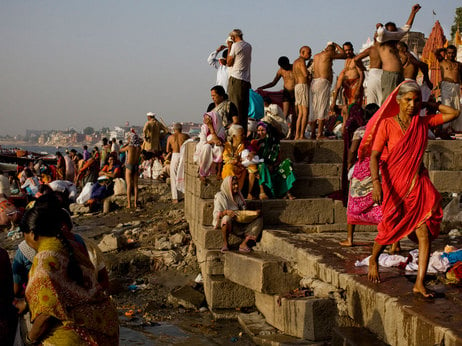
"Morning at a ghat" Source: NPR
This April, NPR Correspondents, Philip Reeves, Julie McCarthy and Nishant Dahiya are taking a road trip across the Indian subcontinent’s famous Grand Trunk Road (GT Road). One of the region’s oldest and longest roads, it originates in Bangladesh, runs across Northern India, and ends in Peshawar, Pakistan. GT Road was built in the 16th century by a Pashtun emperor and has served as one of the most important trade routes in South Asia. NPR is not the first to attempt this ambitious trip; the road’s history, its economic significance to the region, and the fascinating diversity of people and places along its route have long inspired writers to undertake the journey and write about their experiences.
The team began its journey in Kolkata, the sprawling, noisy capital of West Bengal, and is close to finishing up with the Indian portion of the trip. They’ve been blogging about the many sights and sounds encountered along the way. Some of their observations are predictable (“Indians love arguments”, “the occasional cow unhurriedly crossing the modern highway”). They approach the region the way foreigners (and some expatriates) do – with a wide-eyed wonder at sights that are so different from what they’re used to, but are commonplace to most Indians. For instance, one entry marvels at the bright yellow walls in the outskirts of cities that advertise “briefs, panties, and drawers.” This is not unique to GT Road – ads for undergarments populate the walls of most city outskirts across the country. So most readers familiar with India might find that the series has little to offer in terms of what makes this particular journey so unique.
Nevertheless, this is a small quibble, considering the stories lovingly explore the wackiness and chaos that makes the Indian subcontinent so unique. They are also a reminder that for all its explosive economic growth, India still remains a world apart from the sleek, uniform modernity of the West.